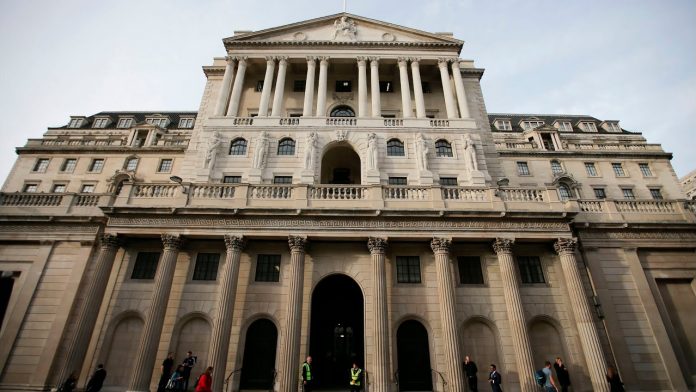
The Bank of England said the British economy had entered a recession as it raised interest rates again to combat inflation
New York (AFP) – Stock markets fell on Thursday after the US Federal Reserve and European central banks launched more massive interest rate hikes aimed at staving off inflation but raised fears of a recession.
On Wall Street, the tech-rich Nasdaq led the main indexes lower, falling 1.4 percent on the day after a sharp rate hike by the Federal Reserve sent stocks tumbling the previous day.
European markets ended lower, with London’s FTSE 100 down 1.1% after the Bank of England raised its sovereign interest rate again and signaled the UK was entering a recession in the current quarter.
The Bank of England’s rise by 0.5 percentage points was less than the Fed’s third consecutive increase of 0.75 points.
“Today saw another bout of downside for stock markets across Europe and the US, as geopolitical and economic concerns dragged risky assets back down,” said Joshua Mahoney, chief market analyst at online trading platform IG.
“In a week dominated by central banks, it has always been difficult to envision a scenario in which traders appear with a positive outlook,” he added.
The world’s major central banks are rushing to raise interest rates to curb hot consumer prices, but traders and many economists fear higher borrowing costs will trigger a global recession.
While the Fed’s latest super move was widely expected, there was some surprise in the central bank’s forecast that borrowing costs were likely to remain above four per cent throughout the next year.
Federal Reserve Chairman Jerome Powell reiterated his intention to focus on lowering inflation – which has reached its highest level in four decades – and before the crackdown hits Americans hard.
“What hit market participants yesterday is that the Fed, led by Fed Chair Powell, really means working now to restore price stability, and if that means a hard landing for the economy, so be it,” said Patrick, analyst at Briefing.com. . O’Hare.
– Japan backtracks on trend –
Switzerland and Norway also raised interest rates significantly on Thursday, two days after Sweden’s massive increase.
In Asia, Indonesia and the Philippines also tightened monetary policy but the Bank of Japan bucked the global trend as it left its status quo in place.
The dollar pared its gains after rising against other major currencies following the Federal Reserve’s interest rate decision.
The British pound briefly fell to a new 37-year low at $1.1212 but recovered after the Bank of England announcement.
The euro touched a new 20-year low for the dollar at $0.9809.
The Japanese yen weakened due to the policy gap between the US and Japanese central banks, and regained strength against the dollar after the Japanese Ministry of Finance said it had intervened in the market to support the currency.
– Key numbers around 2030 GMT –
New York – Dow: down 0.4 percent at 30,076.68 (close)
New York – Standard & Poor’s 500: down 0.8 percent at 3757.99 (close)
New York – Nasdaq: down 1.4 percent at 11,066.81 (close)
London – FTSE 100: down 1.1 per cent at 7159.52 (close)
Frankfurt – DAX: down 1.8 percent at 12531.63 (close)
Paris – CAC 40: down 1.9 percent at 5918.50 (close)
EURO STOXX 50: down 1.9% at 3,427.14 (close)
TOKYO – Nikkei 225: down 0.6 percent at 27153.83 (close)
Hong Kong – Hang Seng Index: down 1.6 percent at 18,147.95 (close)
Shanghai – Composite: down 0.3 percent at 3,108.91 (close)
Pound/dollar: down at $1.1252 from $1.1270 on Wednesday
EUR/USD: rose at $0.9839 from $0.9837
Euro / Pound: rose at 87.40 pence from 87.29 pence
USD/JPY: Decreased at 142.35 yen from 144.06 yen
Brent North Sea crude: 0.7 percent rise to $90.46 a barrel
West Texas Intermediate: up 0.7 percent at $83.49 a barrel












































